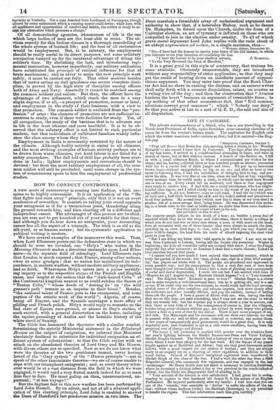HOW TO CONDUCT CONTROVERSY.
A naw mode of controversy is coming into fashion, which pro- mises to be highly convenient. It is an application of the
that fights and runs away" principle, only that it is not an overt confession of cowardice. It consists in taking your stand opposite your antagonist as if for a tremendous joust, thundering along the ground towards him and then slanting off in a:different and Independent career. The advantages of this process are twofold: you are sure not to get knocked out of your saddle for that time ; and although you do bear down no antagonist, your resounding career has all the aspect of a triumph. The trick is as old as the tilt-yard, or as human nature ; but its systematic application to political writing is modern.
We have several examples of the manoeuvre this week. Thus, when Lord Ellesmere points out the defenceless state in which we should be were we invaded, one " Helyx " who writes in the Morning Chronicle makes a ferocious onslaught upon Lord Elles- mere—in the separate field of ethnology. Lord Ellesmere says that London is much exposed ; that France, among other nations, owes us some grudges ; that no nation has maintained its inde- pendence, in modern warfare, without modern military appliances; and so forth.; Whereupon Helyx enters into a jocose mystify- ing inquiry as to the respective stirpes of the French and English mess, and laughs at the notion that the "dark-haired Celts" of the Continental kingdom nearest to us could subdue the Saxon or
Teuton Celts," ' whose deeds of 'derring do' on 'the wild gannet's path remain as an impulse in their blood." Besides, “the national talent of France goes to the ornamental, and some portion of the artistic work of the world "; Algeria, of course, being all filagree, and the Spanish marriages a mere affair of gilding and French polish. Helyx would reply to remarks on the bad state of Epsom race-ground, or abuses in Day's stables, if such existed, with a general dissertation on the horse, including the equine genealogy of Arabia and the heraldic history of the white steed of Saxony.
The Globe has honoured the Spectator with a similar combat. Scrutinizing the strictly Ministerial statement in the Edinburgh Review on the subject of emigration, we inferred that Ministers absolutely declined to substitute for individual emigration an ef- -ficient system of colonization : to that the Globe replies with an attack on the abandoned theories of Lord Grey and Mr. Hawes, with divers others not so specified. Now as we do not know what were the theories of the two gentlemen named, never having heard of the "Grey system" or the "Hawes principle "—not to
• speak of the other innominate theories—we are of course unable to cope with our triumphant antagonist ; and, as every theory what- ever would be at a vast distance from the field in which we were engaged, it would need a very forced march indeed for us to meet Inn face to face. He must gallop on then, unencountered, un- pursued ; "et bon voyage!"
But the highest feat in this new warfare has been performed by Lord John Russell. By an adroit, and not at all a strained appli- cation of this slanting principle, Lord John is enabled to answer the Dean of Hereford's last ponderous missive in two lines. The
Dean marshals a formidable array of ecclesiastical argument and authority to show that, if a heterodox Bishop, such as he deems Dr. Hampden, be forced upon the Church, under the form of a Capitular election, an act of tyranny is inflicted on those who are compelled to join in the election under penalty. To all of which grave moral argument Lord John replies with the rude shock of an abrupt argurnentuin ad metum., in a single sentence, thus- " Woburn Abbey, December 25. " Sir—I have had the honour to receive your letter of the 22d instant, in which you intimate to me your intention of—violating the law. "I have the honour to be your obedient servant, J. RUSSELL. "To the Very Reverend the Dean of Hereford."
It is a great good in this style of controversy, that truisms be- come available. Obviously unanswerable, they are introduce without any responsibility of strict application ; so that they may get the credit of bearing down an indefinite amount of supposi- titious argument. You may enter into proof that the Bank Char- ter Act had no share in causing the distress, and an earnest writer shall sally forth with a counter disquisition, aslant, on avarice as a ruling vice of the day ; and then the observation that "Avarice hardens the heart" becomes an argument of irresistible force ; to say nothing of that other momentous fact, that "Evil oommu- nications corrupt good manners"; which " Nobody can deny.* So that you arrive at last to a sort of Q. E. D., the end and aim of all disputation.






























 Previous page
Previous page